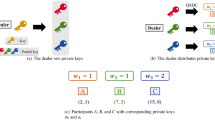Abstract
Motivated by the structure characteristics of Chinese Remainder Theorem(CRT), a continuous variable quantum secret sharing scheme is proposed to ensure the security of the network-based communication system. The initial secret is decomposed and recovered by solving the equations of CRT which provides various threshold structures to enhance the universality, flexibility and practicability of the scheme. The shares are encoded to two-mode squeezed vacuum state by displacement operation for secret distributing. Compared with the discrete variable quantum secret sharing, this scheme can increase the transmission capacity due to the improved data-processing for quantum state generation, manipulation, and detection. The security analysis is elucidated by calculating the bit error rates(BERs) under different conditions and it demonstrates that the scheme has the capability to protect secrets from eavesdropping of dishonest players no matter with the channel transmission efficiency.





Similar content being viewed by others
References
Hillery, M., Bužek, V., Berthiaume, A.: Quantum secret sharing. Phys. Rev. A 59(3), 1829 (1999)
Karlsson, A., Koashi, M., Imoto, N.: Quantum entanglement for secret sharing and secret splitting. Phys. Rev. A 59(1), 162 (1999)
Zhang, Z., Man, Z.: Multiparty quantum secret sharing of classical messages based on entanglement swapping. Phys. Rev. A 72(2), 022303 (2005)
Li, Y., Zhang, K., Peng, K.: Multiparty secret sharing of quantum information based on entanglement swapping. Phys. Lett. A 324(5–6), 420–424 (2004)
Cleve, R., Gottesman, D., Lo, H.K.: How to share a quantum secret. Phys. Rev. Lett. 83(3), 648 (1999)
Zhang, Z.: Controlled teleportation of an arbitrary n-qubit quantum information using quantum secret sharing of classical message. Phys. Lett. A 352(1–2), 55–58 (2006)
Qin, H., Tso, R.: Efficient quantum secret sharing based on special multi-dimensional GHZ state. Opt. Quant. Electron. 50(4), 167 (2018)
Khakbiz, P., Asoudeh, M.: Sequential quantum secret sharing in noisy environments. Quantum Inf. Process 18(1), 11 (2019)
Guo, Y., Liao, Q., Huang, D., Zeng, G.: Quantum relay schemes for continuous-variable quantum key distribution. Phys. Rev. A 95, 042326 (2017)
Guo, Y., Xie, C., Huang, P., Li, J., Zhang, L., Huang, D., Zeng, G.: Channel-parameter estimation for satellite-to-submarine continuous-variable quantum key distribution. Phys. Rev. A 97(5), 052326 (2018)
Guo, Y., Ye, W., Zhong, H., Liao, Q.: Continuous-variable quantum key distribution with non-Gaussian quantum catalysis. Phys. Rev. A 99(3), 032327 (2019)
Vaidman, L.: Teleportation of quantum state. Phys. Rev. A 49(2), 1473 (1994)
Braunstein, S.L., Kimble, H.J.: Teleportation of continuous quantum variables. Phys. Rev. Lett. 80(4), 869 (1998)
Furusawa, A., Sørensen, J.L., Braunstein, S.L., et al.: Unconditional quantum teleportation. Science 282(5389), 706–709 (1998)
Lloyd, S., Braunstein, S.L.: Quantum Computation over Continuous variables//Quantum Information with Continuous Variables, pp 9–17. Springer, Dordrecht (1999)
Albash, T., Lidar, D.A.: Adiabatic quantum computation. Rev. Modern Phys. 90(1), 015002 (2018)
Feng, Y., Shi, R., Zhou, J., Liao, Q., Guo, Y.: Quantum byzantine agreement with tripartite entangled states. Int. J. Theor. Phys., 1–17 (2019)
Feng, Y., Shi, R., Guo, Y.: Arbitrated quantum signature scheme with continuous-variable squeezed vacuum states. Chin. Phy. B 27(2), 020302 (2018)
Guo, Y., Feng, Y., Zeng, G.: Quantum anonymous voting with unweighted continuous-variable graph states. Quantum. Inf. Process 15(8), 3327–3345 (2016)
Tyc, T., Sanders, B.C.: How to share a continuous-variable quantum secret by optical interferometry. Phys. Rev. A 65(4), 042310 (2002)
Lance, A.M., Symul, T., Bowen, W.P., et al.: Continuous variable (2, 3) threshold quantum secret sharing schemes. New J. Phys. 5(1), 4 (2003)
Zhou, N., Song, H., Gong, L.: Continuous variable quantum secret sharing via quantum teleportation. Int. J. Theor. Phys. 52(11), 4174–4184 (2013)
Zhou, Y., Yu, J., Yan, Z., et al.: Quantum secret sharing among four players using multipartite bound entanglement of an optical field. Phys. Rev. Lett. 121(15), 150502 (2018)
Shi, R., Su, Q., Guo, Y., et al.: Quantum secret sharing based on chinese remainder theorem. Commun. Theor. Phys. 55(4), 573 (2011)
Guo, Y., Zhao, Y.: High-efficient quantum secret sharing based on the Chinese remainder theorem via the orbital angular momentum entanglement analysis. Quantum Inf. Process 12(2), 1125–1139 (2013)
Asmuth, C., Bloom, J.: A modular approach to key safeguarding. IEEE Trans. Inform. Theory 29(2), 208–210 (1983)
He, G., Zhu, J., Zeng, G.: Quantum secure communication using continuous variable Einstein-Podolsky-Rosen correlations. Phys. Rev. A 73(1), 012314 (2006)
Acknowledgements
This work was supported by the National Natural Science Foundation of China (Grant Nos. 61401519, 61872390, 61871407), the Natural Science Foundation of Hunan Province (2017JJ3415).
Author information
Authors and Affiliations
Corresponding author
Additional information
Publisher’s Note
Springer Nature remains neutral with regard to jurisdictional claims in published maps and institutional affiliations.
Rights and permissions
About this article
Cite this article
Kang, Y., Liao, Q., Geng, J. et al. Continuous Variable Quantum Secret Sharing with Chinese Remainder Theorem. Int J Theor Phys 58, 3986–3997 (2019). https://doi.org/10.1007/s10773-019-04265-7
Received:
Accepted:
Published:
Issue Date:
DOI: https://doi.org/10.1007/s10773-019-04265-7




